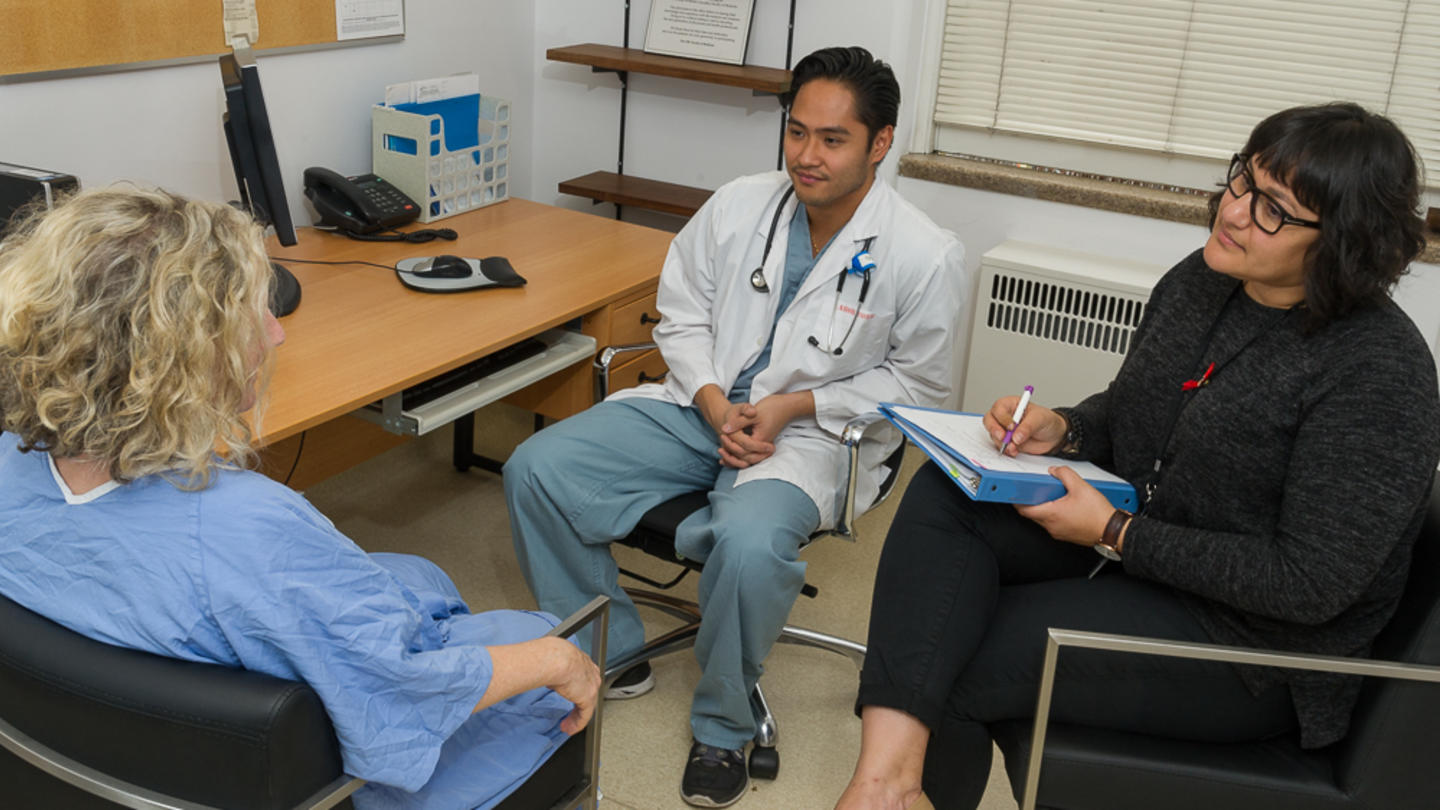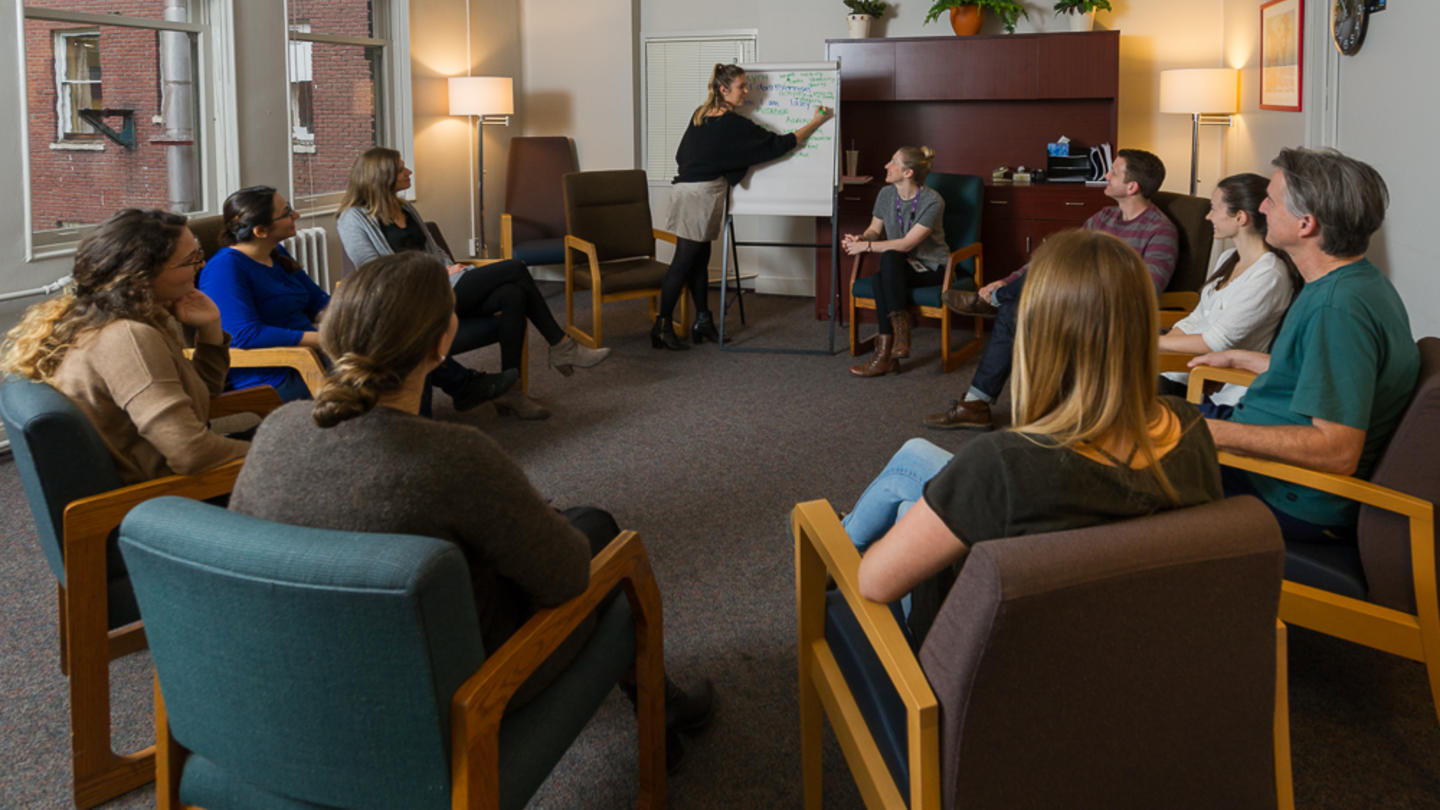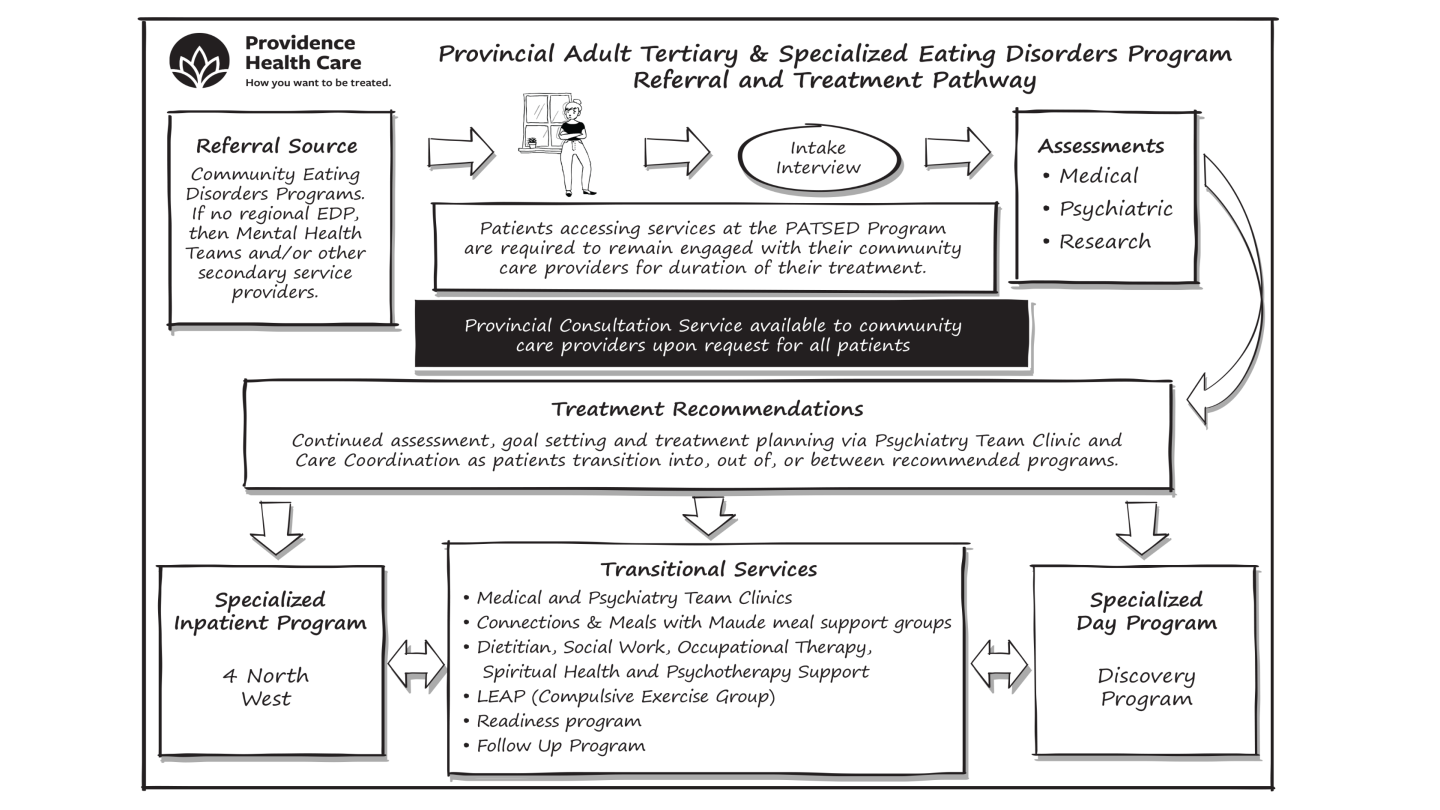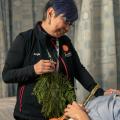Eating disorders
An overview of the Provincial Adult Tertiary & Specialized Eating Disorders (PATSED) Program at St. Paul’s Hospital.
Overview
An eating disorder is about more than just food. It is a type of mental illness that involves unhealthy thoughts and behaviours towards food, weight, and body shape.
Eating disorders can affect people of any age, race, gender or sexual orientation. If you have an eating disorder, you might worry so much about food that it makes it difficult to work, go to school, or enjoy time with friends.
The Provincial Adult Tertiary & Specialized Eating Disorders (PATSED) Program at St. Paul’s Hospital treats patients 17 years of age or older with a variety of eating disorders. This includes anorexia nervosa, bulimia nervosa, and other specified feeding or eating disorders.
Our philosophy of care is: ‘Right patient, right treatment, right time.’
We work with patients to match them up with the right treatment at the right time. The team believes that each person’s journey is unique. Treatment planning will be different for each patient.
It is important for patients to think about their level of readiness for treatment. This helps them get the most benefit possible from the program. Our team uses a holistic approach, and is guided by research-and evidence-based practice.
Contact
St. Paul’s Hospital
4 North, Burrard Building
1081 Burrard Street
Vancouver, BC V6Z 1Y6
Eating Disorders Program Intake Coordinator

Diagnosis & assessment
Eating disorders are diagnosed based on symptoms and a review of eating habits and behaviours. If you think you might have an eating disorder, the first step is to contact your family doctor. They can confirm a diagnosis and provide a referral to the PATSED program at Providence, or an eating disorder program in your area. Learn more about how to find a family doctor if you don't have one.
If you are referred to the program, the following assessments will help determine the recommended care.
Treatment & management
For people with eating disorders, recovery can be scary. It isn’t easy to ask for help and finding the best treatment may take time. Treatment recommendations will vary depending on your individual needs.
Watch this video to learn more about what happens once you enter our program.
Hospital (inpatient) treatment
If you sleep at the hospital during treatment for an eating disorder, it is called inpatient treatment. Our inpatient treatment program is recommended when someone needs intensive support from a team of care providers. The team will help them work toward their nutritional, medical and psychological goals.
Our inpatient program is called 4 Northwest (4NW). It is located on the 4th floor of the Burrard Building at St. Paul’s Hospital.
The 4NW program has 2 phases or stages. Both phases help patients explore treatment in a structured and supportive environment.
Patients can prepare for their admission by reviewing our handbook.
Intensive day program (outpatient) treatment
Some individuals will be recommended to participate in our intensive day treatment program. Our intensive day program is called Discovery/Vista. The daily programming takes place at St. Paul’s Hospital. Participants live at Vista House, a housing facility located in Vancouver.
Both elements of the program help patients explore treatment in a structured and supportive environment.
Transitional Services for Eating Disorders
Our program offers a variety of transitional services that support patients as they work to prepare for our program. These services are again available as patients transition back to their communities following their admission.
Support services
Providence Health Care offers a variety of services to support those we care for. The following services may be of use or benefit to you and your families.

Support for Indigenous Peoples
The Indigenous Wellness Liaison Team is here to support your health journey. Team members offer cultural support and healthcare advocacy. Learn more below or call them at 604-682-2344,62937 or email IWL@providencehealth.bc.ca.
Education & resources
Patient-centred help, resources, important phone numbers and education about eating disorders come from many sources.
Some resources listed here come from St. Paul's Hospital and Providence Health Care. Other useful resources about eating disorders are available from the community and from online supports.
Useful resources
Websites & other resources
Community & events
How can you help a loved one with an eating disorder?
Family/support persons are an important part of treatment. Families may attend an information meeting with members of the treatment team. This meeting is to clarify treatment goals and provide an opportunity for questions about the treatment. With the patient’s consent, families/support persons have ongoing involvement in the treatment. They may help plan for when the patient returns home. There may also be an opportunity for short term family therapy.
Eating Disorders Program Patient/Family Advisory Committee
The Eating Disorders Patient and Family Advisory Committee started in 2013 to strengthen the partnership between patients and family members, and clinicians and administrators. PHC’s commitment to person- and family-centered care is to ensure patient and family voices, opinions, and viewpoints of the care experience are included, valued, respected, and understood. The committee works together to create positive change, and strengthen patient and family involvement. We have many shared learning opportunities and experiences. If you or a loved one is interested in being part of the committee, ask to speak with the manager of the program. They can give you more information.

Events
Family and Friends webinars
These webinars provide education on eating disorders and the process of recovery work. They teach family and friends how they can offer support to their adult loved one.
Note: these webinars are for supporters of those with an eating disorder (including practitioners). They are not for clients.
Supporters of individuals with eating disorders can interact with a family therapist, occupational therapist, psychiatrist, and dietitian. They can also engage with former clients who received treatment from the PATSED Program. These webinars are open to professionals who want more information about eating disorders treatment for adults and their families. The webinar series is offered three times a year. Dates and registration details are sent to active clients and the secondary services around the province.
Topics covered in the webinar are:
- What is an eating disorder and how do they develop
- How eating disorders are treated with adult clients
- Health (medical/psychiatric) implications
- Nutrition considerations and meal support
- Emotional and psychological connections to eating disorders
- The recovery process
- What family and friends can do to support their loved one’s recovery
Ask the treatment team for more information on upcoming Family and Friends webinars or register here.
Research
Staff and patient participation in teaching and research helps us provide the best care possible. Clinical and research staff provide regular training to staff working with individuals with eating disorders at Providence, and across the province.
Patients and families help us learn what works well about our care, and how we can improve it. The program research team runs grant-funded projects that seek to deepen our understanding of how to best meet the needs of our patients and families. The Director of Research in our program is Dr. Josie Geller.
Medical & professional referrals and consultation options

We require a referral for assessment and treatment. Referrals are received from a secondary eating disorder program within the province. If there is no secondary program available, mental health teams or community care providers can provide referrals. For referral inquiries, individuals can contact the Intake Coordinator at 604-806-8654.
The general referral criteria for the Eating Disorders Program are as follows:
- A primary diagnosis of anorexia nervosa, bulimia nervosa or Other Specified Feeding or Eating Disorder (OSFED)
- Followed by a primary care provider ie. family doctor/ nurse practitioner.
- Followed by a secondary eating disorders program where available. In the absence of a secondary eating disorders program, individual is followed by mental health teams, and/or other secondary service community care providers.
- Resident of BC (some exceptions may apply)
- 17 years of age (out of high school) or older
Consultation options
We provide interdisciplinary provincial consultation to health care professionals regardless of whether the patient is receiving tertiary level of care services. The purpose of clinical consultation is to provide clinical advice to health care providers caring for individuals with a diagnosis of an eating disorder (ages 17 years and older). This service supports individuals receiving care closer to home. It also promotes continuity of care between specialized services and regional/community health care providers.
